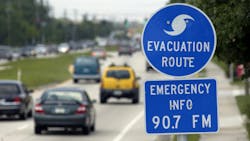State DOTs Along Hurricane Helene’s Path Brace for Impact
State Departments of Transportation, including Georgia, South Carolina and Alabama, along the leading edge of Hurricane Helene are preparing drivers for potential impacts to roads and bridges.
The Georgia Department of Transportation (GDOT) says it anticipates Helene to bring damaging winds, heavy rainfall and flooding statewide. All GDOT district teams have equipment loaded and crews are on alert, including immediate-response strike teams ready to respond to the hurricane, according to the department.
This storm system will likely impact citizens throughout each state, with the potential for prolonged power outages, downed trees as well as possible tornado activity the remainder of this week.
Throughout the state, GDOT says priority will be placed on interstates, then state routes with highest priority given to routes to hospitals and other essential public services.
The South Carolina Department of Transportation is similarly asking motorists to be weather aware and stay tuned to official sources of information including the South Carolina Emergency Management Division, local officials and local broadcasts.
Parts of Alabama along the Georgia line are also expected to experience high winds and heavy, sustained rainfall. Impacts in Alabama will begin sometime Wednesday and last through Friday.
Emergency coordinators from the Alabama Department of Transportation (ALDOT) will be stationed at the Alabama Emergency Management Agency’s command center to work in conjunction with local officials and to direct resources as needed. ALDOT crews have made preparations to deal with storm-related damage as Helene moves inland.
All departments ask motorists to exercise caution during the event, including the following safety tips:
- Stay off the roads: If possible, avoid driving during the height of the storm and immediately after.
- Be aware of flooding: Do not attempt to drive through flooded areas. Turn around, don’t drown.
- Use caution on wet roads: Reduce speed, increase following distance, and avoid sudden braking or swerving.
- Watch for downed trees and power lines: Be alert for potential hazards that may be obscured by storm conditions.
- Have an emergency kit: Keep a well-stocked emergency kit in your vehicle, including essentials like water, food, a flashlight, and a first-aid kit.
Source: Georgia Department of Transportation, South Carolina Department of Transportation, Alabama Department of Transportation
